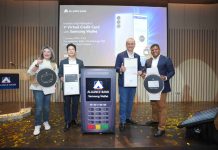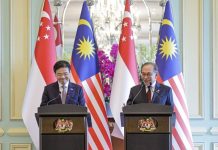- Economy Accelerates at Faster Pace
- MoF Implements National Regulatory Sandbox Initiative
- Malaysia’s External Debt Remains Manageable, Says Central Bank
- Singapore’s GDP Growth in 2018 Expected to Moderate but Remain Firm
- Celebrating Valentine’s Day, the A.I Way
- Senior Care International to Launch World’s First Cryptocurrency Agecoin Targeted at Aged Care
Economy Accelerates at Faster Pace
Data from the Department of Statistics showed that the Malaysian economy which registered a Gross Domestic Product of 5.9 per cent in 2017, accelerated at a faster pace with a value of RM1.17 trillion (2016:4.2 per cent) at constant prices and RM1.35 trillion at current prices. The DOS said the services, manufacturing and agriculture sectors were the anchor on the production side, with all sectors recording positive growth except mining and quarrying. “On the expenditure side, the performance was driven mainly by private final consumption expenditure.” Bank Negara Malaysia today announced a GDP growth of 5.9 per cent for both the fourth quarter of 2017 and for the full year. The department said the services sector registered a strong growth of 6.2 per cent in the quarter under review, underpinned by wholesale and retail trade and information and communication sub-sectors.
MoF Implements National Regulatory Sandbox Initiative
The Ministry of Finance has implemented the National Regulatory Sandbox Initiative which involves the creation of a brain-storming group from regulators and selected industry players to enable innovators to test their solutions or products in a conducive environment. The Ministry’s Secretary-General, Tan Sri Dr Mohd. Irwan Serigar Abdullah, said the government wanted the regulators to have an open mind on the rapidly-changing technology and amend appropriate laws for the implementation of the new initiative. “For investors and young entrepreneurs as well as startup companies to start business, regulations or business rules must be appropriate and conducive for them to operate.” He said the sectors identified for the Sandbox Initiative were agriculture; biotechnology; building; education; energy; financial; food; green technology; healthcare; hospitality; smart city; sports; telecommunication; transportation; tourism; water management; and, waste management.
Malaysia’s External Debt Remains Manageable, Says Central Bank
Bank Negara Malaysia said the country’s external debt remains manageable given its currency and maturity profiles, as well as, the availability of large external assets. As at end-December 2017, Malaysia’s external debt amounted to RM883.4 billion, equivalent to US$215.5 billion or 65.3 per cent of Gross Domestic Product (GDP) versus RM873.8 billion or US$204.7 billion or 64.6 per cent of GDP as at end-September 2017. The Central Bank said the higher external debt reflected the increase in loans, interbank borrowing and non-resident (NR) holdings of domestic debt securities which was partially offset by valuation effects following the strengthening of the ringgit against selected major and regional currencies during the fourth quarter. “More than one-third of total external debt is denominated in ringgit (34.3 per cent), mainly in the form of NR holdings of domestic debt securities and in ringgit deposits in domestic banking institutions. “As such, these liabilities are not subjected to valuation changes from the fluctuations in the ringgit exchange rate.”
Singapore’s GDP Growth in 2018 Expected to Moderate but Remain Firm
The Ministry of Trade and Industry announced today that the Singapore economy grew by 3.6 per cent in 2017. For 2018, MTI expects GDP growth to moderate from 2017’s growth but remain firm. MTI’s central view is for GDP growth to come in slightly above the middle of the forecast range of “1.5 to 3.5 per cent”. The Singapore economy grew by 3.6 per cent on a year-on-year basis in the fourth quarter, easing from the 5.5 per cent growth in the third quarter. On a quarter-on-quarter seasonally-adjusted annualised basis, the Singapore economy expanded by 2.1 per cent, a moderation from the 11.2 per cent growth in the preceding quarter.

Celebrating Valentine’s Day, the A.I Way
This Valentine’s Day, millions of people around the world will express their feelings and celebrate the special relationships they have with their loved ones, through the exchange of cards and gifts. This year, in China, many more are likely to say ‘I love you’ to a girl named ‘Xiaoice’, and she is an Artificial Intelligence-powered chatbot. Thanks to AI, we are currently witnessing a paradigm shift in technology, moving from a world where we have to understand computers to one where they now understand us and our intent. And this is not only revolutionizing how we live, work and play; it is upending our entire relationship with technology. This disruption is brought about by the next big shift in computing, one that is fueled by advances in AI and built around a behavior that is the most natural of all to humans — conversations. Conversational AI, such as chatbots, heralds a new era where digital experiences can now mirror the way people interact with fellow humans. And there is much to love about this new development. Mircrosoft’s work with chatbots expanded rapidly with the launch of Xiaoice in China. This intelligent, natural-language bot is programmed to behave like an 18-year-old girl who is emphatic, humorous and affable. The conversations that she has with users range from advice about what activities to do during the day to relationship feedback. Using advanced machine learning algorithms, her responses mirror what a teenage girl would tell her friend, sometimes with sarcasm included. Xiaoice can also speak with people over the phone and use streaming video to detect emotions and engage in conversations based on the person’s expressions. Today, she has conversed with more than 100 million users, averaging approximately 23 exchanges per session. This is nearly 10 times the industry average. In fact, it has been estimated that 25% of users have already declared their love to Xiaoice.
Senior Care International to Launch World’s First Cryptocurrency Agecoin Targeted at Aged Care
Senior Care International, a senior care services company will be launching a world’s first-of-its-kind cryptocurrency called Agecoin (AGC). There will be a blockchain built around the Agecoin (AGC) which aims to improve and support pension-related financial services, introducing a revolutionary new way to change how pension schemes operate currently. Mr Richard Tang, CEO of Senior Care International, said: “The funds raised by Agecoin will be used to build and develop infrastructure for pension services in the future. We will leverage blockchain technology to improve pension financing services. ” “Agecoin is the world’s first cryptocurrency based on blockchain technology. Its use of blockchain technology combined with big data analytics aims to provide the elderly worldwide with a transparent and an easy-to-use service. As Agecoin becomes more widely accepted in the global pension eco-finance scene, we look forward to enabling Agecoin as a universally accepted digital currency for retirement services”, Mr Tang added.
























